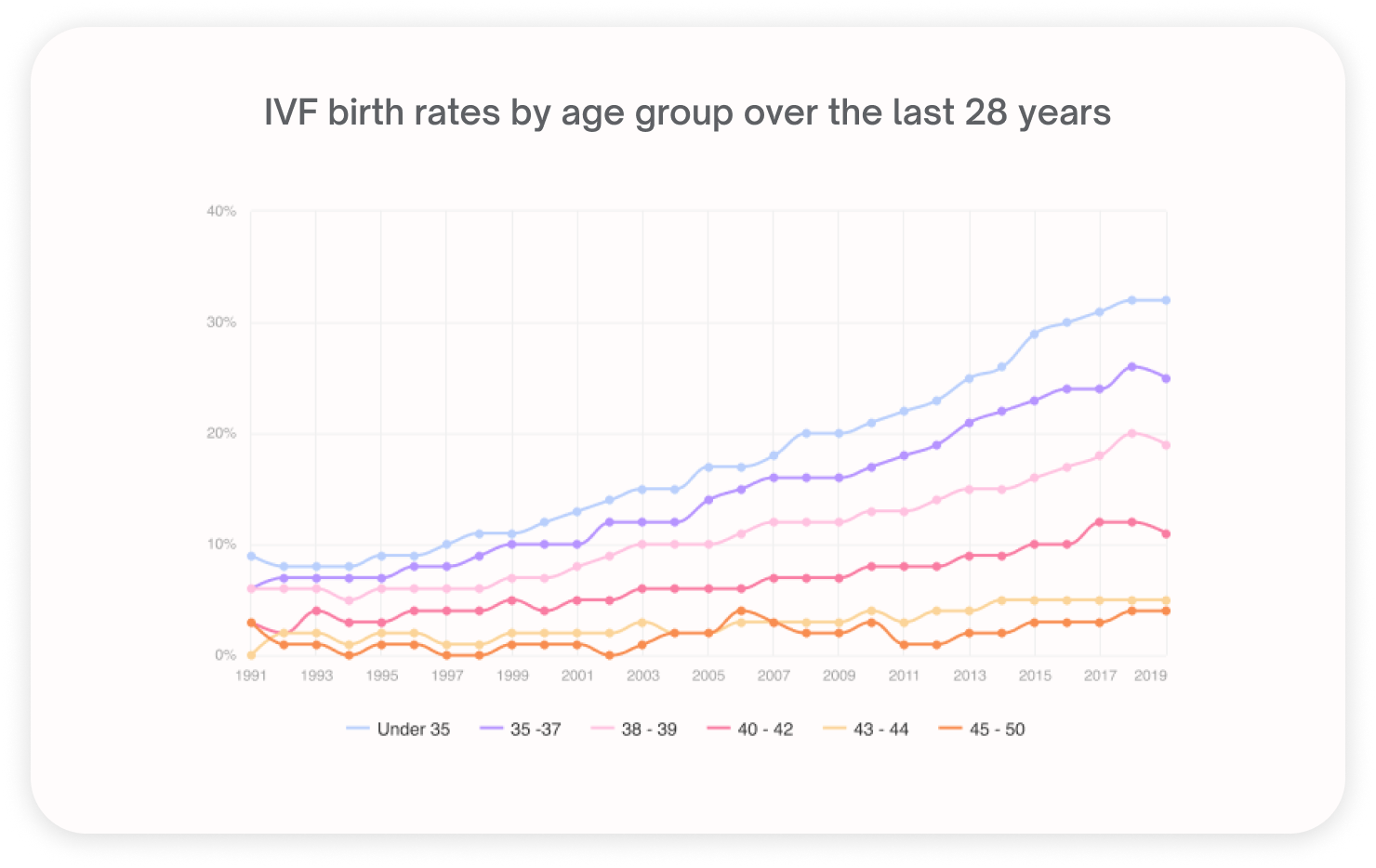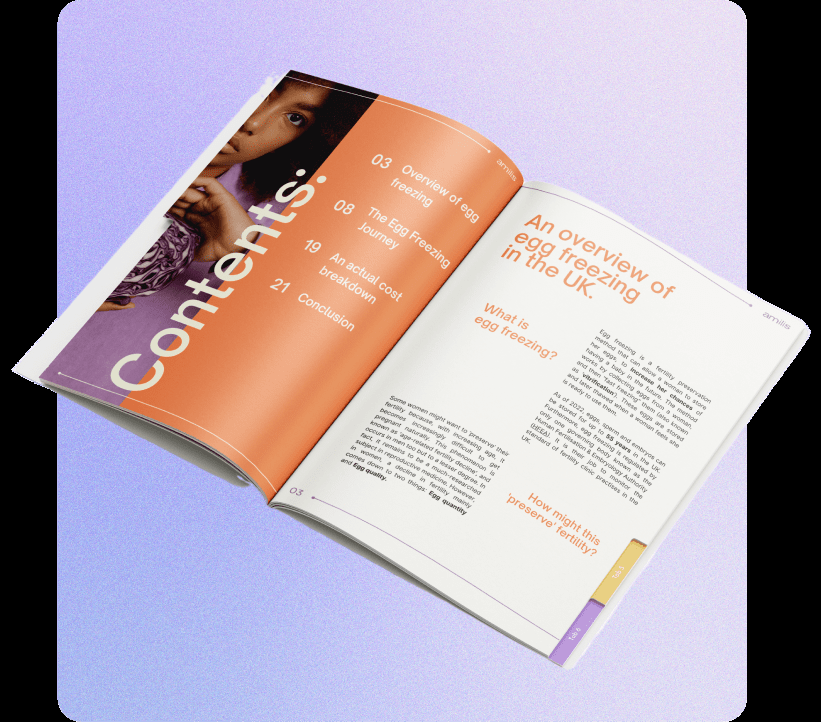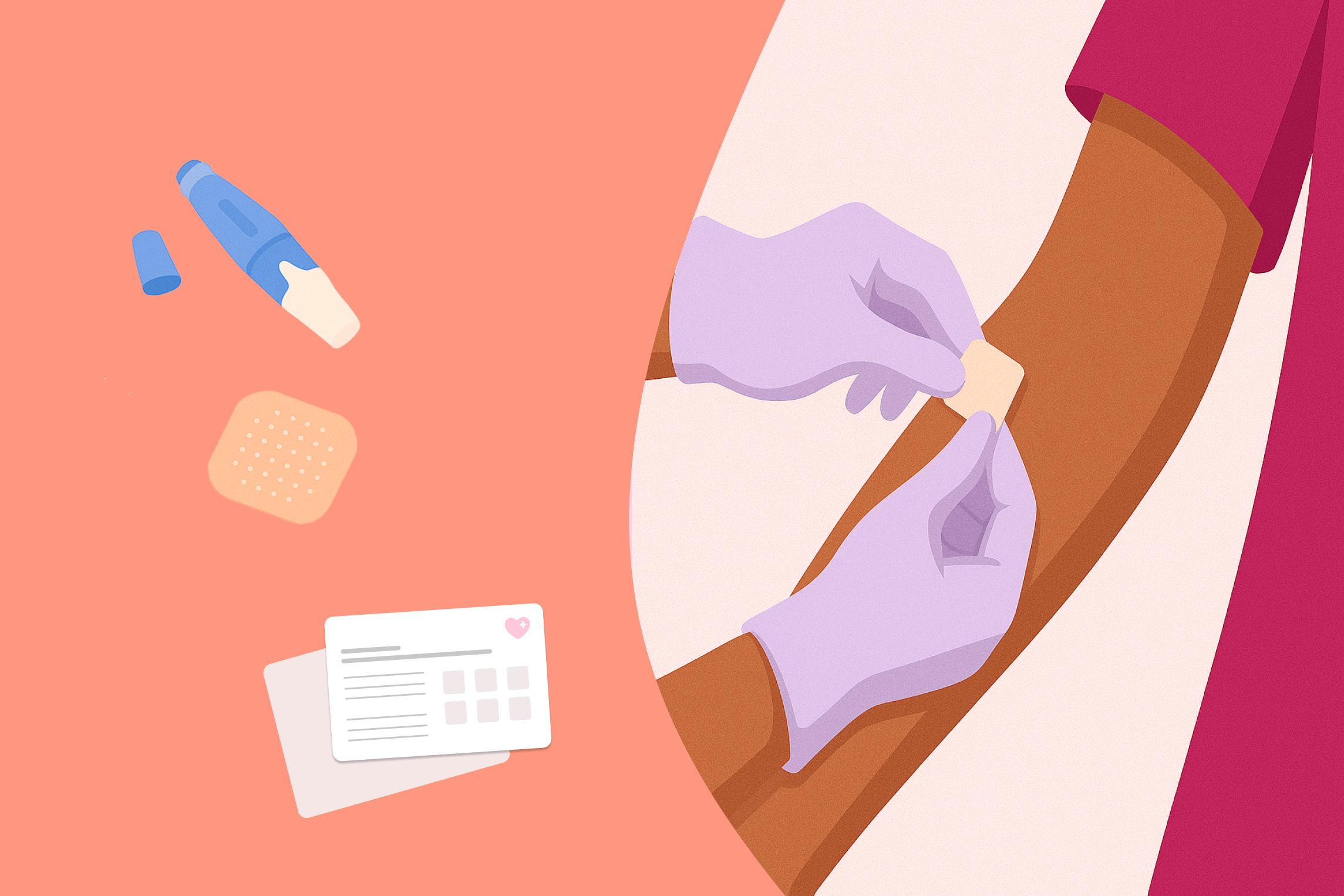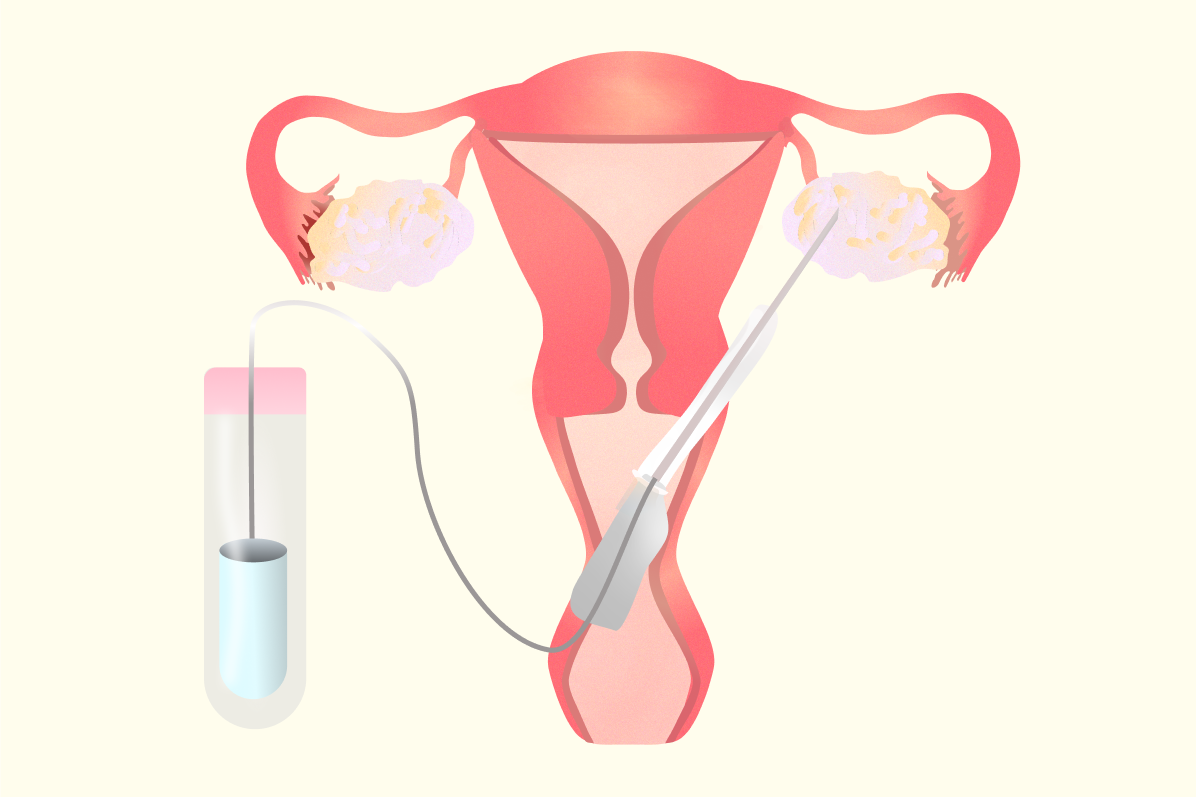Contents
- What are Egg Freezing Success Rates?
- Egg Freezing Success Rates Calculator
- Which Factors Can Affect Egg Freezing Success Rates?
- Are Egg Freezing Success Rates Improving
- Egg Freezing Success Rates by Age (+Chart)
- How are Egg Freezing Success Rates Calculated in the UK
- How do Success Rates Vary Between Clinics?
- What can I ask a fertility clinic about their success rates?
- Find the right Fertility Clinic in the UK, via Amilis
In an eggshell...
- As per HFEA data from 2016, 18% of frozen egg fertilisation cycles were successful
- However, there are newer studies that point to better live birth rates for individuals who come back to use their eggs
- Egg freezing cycles have increased across all age groups from 2019 to 2023, with the largest increases among patients aged 30-37
- Age at freezing is the key factor affecting success rates. Apart from that, your ovarian reserve, response to medication, health conditions, lifestyle factors, and the number of eggs frozen play a role
- Success rate definitions vary between clinics, but asking the right questions can help your journey
Success rates, and with egg freezing?
Surprisingly, yes. Egg freezing success rates is a parameter that’s influenced by a lot of factors.
Imagine it as a wall being built brick by brick. Basically, your age, the clinic chosen, and the treatment protocol all form a brick in this wall, and play a key role in how successful your egg-freezing cycle can be.
And by that we mean, how successfully they go through freezing, warming and implantation, aka from frozen egg to an actual baby.
So regardless of the reason behind your egg-freezing journey, the question really boils down to this: What’s the success rate for my egg-freezing cycle, and will it result in a healthy pregnancy when I’m ready to use them?
Let’s do a deeper dive into what factors affect your egg-freezing cycles, how clinics calculate success rates, and what this means for you.
What are Egg Freezing Success Rate?
Based on the stage of your egg freezing cycle, there are different definitions of success rates. Here’s a quick breakdown:
- Egg retrieval rate: This measures whether at least one mature egg (metaphase II oocyte) is collected during a cycle. It’s calculated by looking at the number of cycles where a mature egg is retrieved, divided by the total number of cycles started.
- Egg survival rate: The survival rate is the number of frozen eggs that remain viable after thawing, divided by the total number of eggs thawed.
- Fertilisation rate: After thawing, mature eggs are inseminated with sperm (via ICSI, or intra cytoplasmic sperm injection). This rate is the number of eggs that successfully form zygotes, divided by the total number of mature eggs inseminated.
- Embryo development rate: Not every fertilised egg will keep dividing normally. This rate measures how many fertilised eggs progress into embryos of good enough quality to be considered for transfer or freezing, divided by the total number of fertilised eggs.
- Implantation rate: Once embryos are transferred to the uterus, the implantation rate looks at how many actually implant. It’s the number of gestational sacs seen on ultrasound, divided by the number of embryos transferred.
- Live birth rate:This is the most common way to calculate egg-freezing success rates. It is calculated by dividing the number of live births (or babies carried to full term) by the number of eggs frozen. It’s influenced by factors like age at freezing, egg quality, and embryo competence.
You’ll see live birth rates used regularly, as this is the end goal most women are thinking of. But it doesn’t always paint the whole picture. The steps in between also add up to the final stage, making them just as important.
Egg Freezing Success Rates Calculator
If you’ve frozen your eggs and are looking for a success rates calculator, here’s one to check out:
Which Factors Can Affect Egg Freezing Success Rates?
Several factors can impact the outcomes of egg freezing (and, ultimately, fertilisation and pregnancy). Some of these include:
Age
Age is the most significant factor influencing egg-freezing success rates. Egg quality declines with age, thus increasing the chances of genetic abnormalities or reducing the chances of embryo formation or development.
Younger women tend to have higher-quality eggs, which have a better chance of surviving the freezing and thawing process. This results in more successful pregnancies.
Ovarian Reserve
Ovarian reserve is the quantity and quality of a woman's remaining eggs. Fertility tests such as Anti-Mullerian Hormone and Antral Follicle Count can provide insight into your ovarian reserve.
Women with a higher ovarian reserve usually have larger numbers of viable eggs available. Especially at younger ages, since the quality is higher, there is a chance of freezing more number of good quality eggs.
Medical history and health conditions
Health conditions, such as genetic disorders and autoimmune diseases, can impact egg quality and fertility.
Whilst conditions like polycystic ovary syndrome (PCOS) or endometriosis can affect egg freezing success rates, egg freezing is often still an effective fertility treatment for these women.
Response to Ovarian Stimulation
Before egg freezing, you are put on ovarian stimulation protocols to help increase the number of follicles maturing for the month.
Growth-inducing hormones such as FSH (Follicle-stimulating hormone) and LH (Luteinizing Hormone) are injected to stimulate the ovaries to produce multiple follicles and thus, eggs. However, there’s no “one protocol fits all” solution, and your body’s response to stimulation may vary, which in turn may affect your success rates.
In some cases, if your response is lower than expected, there are genetic or blood tests conducted to figure out the cause and personalise the protocol for you accordingly.
Freezing Method
The method used for freezing eggs can also affect success rates. Earlier, a slow freezing protocol was used to freeze eggs, which had lower success rates.
However, most clinics have now adopted an updated method, Vitrification, or rapid freezing technique, which has better success rates than the previous method.
Clinic Expertise and Laboratory Techniques
The experience and expertise of the fertility clinic and its laboratory staff play a crucial role in determining success rates.
Skilled professionals and state-of-the-art laboratory techniques can improve the handling, freezing, and thawing processes, increasing the chances of success.
Lifestyle factors
Factors like smoking, excessive alcohol consumption, and obesity can negatively impact egg quality and overall fertility. This is reflected in success rates.
Additionally, stress can impact fertility and egg freezing. Bodily changes associated with stress, including the production of cortisol, are linked to reduced egg quality and lower pregnancy rates.
Number of Eggs Frozen
It’s a fine balance between the number of stimulation cycles and collecting enough eggs. You may start out with 12 follicles and end up with 7-8 eggs, with 5-6 fertilised.
Hence, egg-freezing cycles aim to increase the number of mature eggs collected.
Women below 38 usually have 7-14 eggs collected, but the number varies from clinic to clinic.
While these factors can affect success rates, at the end of the day, everyone’s situation is unique. Reaching out to a fertility specialist can help with personalised guidance and assessment of the likelihood of success based on individual circumstances.
Are Egg Freezing Success Rates Improving?
Egg-freezing success rates have been improving in recent years. The most recent Human Fertilisation and Embryology Authority (HFEA) figures from 2016 suggest 18% of cycles where a woman’s own frozen egg was fertilised resulted in a live birth. For donor eggs, the percentage stands at 30%.
But there are other studies that report a live birth rate of 28.9% for egg freezing cycles.
This is largely due to the development of new technologies, such as vitrification.
Vitrification offers higher survival rates and better chances of successful pregnancy, compared to its previous counterpart, the slow freezing method.
Embryo genetic screening (PGT-A) and automation of freezing protocols are also contributing to increased success rates and more predictable outcomes.
Additionally, clinics now have access to better equipment and resources and have standardised the procedure, leading to minimal errors.
Egg Freezing Success Rates by Age (+Chart)
As per the HFEA, the majority of women freezing their eggs via the NHS were under 35, with almost 90% being under 38.
However, as per the latest HFEA data, the most common age range in the UK for egg freezing is 30-37.
But if we were to look at egg freezing success rates by age, this is how it would look like:
As per statistics, a woman below 35 years of age would need around 15 eggs for a 80% chance at a live birth rate or a successful pregnancy. And as per the table, the statistics decrease for women older than 35 and 40.
And as age increases, the number of eggs needed for a better success rate also increases, indicating the need for multiple egg freezing cycles.
What are egg-freezing success rates like for women above 35?
As mentioned above, age is the most important factor affecting egg-freezing success rates. Women who freeze their eggs before the age of 35 have a much higher chance of success.
Interestingly, when you freeze your eggs matters more, compared to when you use them.
This is because the number and quality of eggs decline with age: women who freeze their eggs before 35 have more eggs of better quality.
However, given that the average age range of women freezing their eggs in the UK is 30-37, the data from HFEA mostly represents women in their 30s.
The HFEA also advises women to use the IVF success rates for women in their age group (using fresh eggs), rather than egg freezing success rates. This data is likely to better represent the live birth rate from frozen egg fertilisation, especially in women below 35.

How are Egg Freezing Success Rates calculated in the UK?
In the UK, the HFEA (Human Fertilisation and Embryology Authority) regulates the practice of egg freezing. The HFEA sets standards for fertility clinics and makes sure that:
- Patients are given accurate information about the risks and benefits of egg freezing
- Patients are treated safely and ethically
- Patients can make informed decisions about egg freezing
- Clinics provide high-quality care
- Clinics keep records of all egg-freezing procedures
The HFEA requires fertility clinics to publish their success rates, but they don't regulate how those rates are calculated. Plus success rates may vary based on the number of cases a clinic has.
The verdict? 🧑⚖️
Well, we recommend still sticking to the figures rather than anything else, as technically, they still represent statistics around egg freezing.
How Do Egg Freezing Success Rates Vary Between Clinics?
As clinics calculate success rates differently, it can be difficult to compare.
Clinics may use different denominators when reporting live birth rates (per retrieval, per cycle, per embryo transfer, or per thaw), making direct comparison challenging.
Success rates can vary due to different patient selection, techniques, medical expertise, and the clinic's overall experience in performing egg-freezing procedures.
So, what's a girl to do?
Let’s talk about what you can ask to understand how successful a clinic really is.
What Can I Ask a Fertility Clinic About Their Success Rates?
You're about to make a big decision that could impact your future, so it's important to get all the information you can before you choose a clinic for your egg-freezing journey.
That includes asking specific questions about the clinic's success rates.
These can include:
- What is your success rate for women who freeze their eggs before the age of 35? And after?
- Can you provide information on the success rates for women of my age group?
- How do you calculate your success rates?
- What is your clinic's success rate for live births per X number of eggs frozen/thawed?
- How does your clinic's success rate compare to national averages or benchmarks?
- Are there any additional factors that may impact success rates in my case?
In the end, all you’re trying to get is the information that will benefit your journey. Ideally, the more insights, the better informed you will be to make decisions with your healthcare provider.
Find the Right Fertility Clinic in the UK, via Amilis
Choosing a fertility clinic can be like comparing apples to oranges. There are so many factors that come into play, such as the distance, the team, and your experience, and one of the most crucial ones happens to be success rates.
Remember, it's okay (and necessary) to ask your clinic about their success rate and any other questions that you may have about the process.
To make this journey easier, when you go via Amilis, you get the right resources and the best support, all from day one. Here’s all you get:
- Book an AMH test for just £80 and a full hormone panel for £130 (50% cheaper than fertility clinics)
- Get free consultations with expert doctors across the UK
- Free consultations with vetted egg freezing clinics near you
You can even start with our clinic comparator to assess clinics nearby. With Amilis, you also get a stellar team (that's us 👋) supporting you with every step!
Still unsure on how to choose or wondering if egg freezing is right for you? Don’t worry, we can help - take our fertility quiz to get started.
You’ve got this ♥️





.png)




.png)

